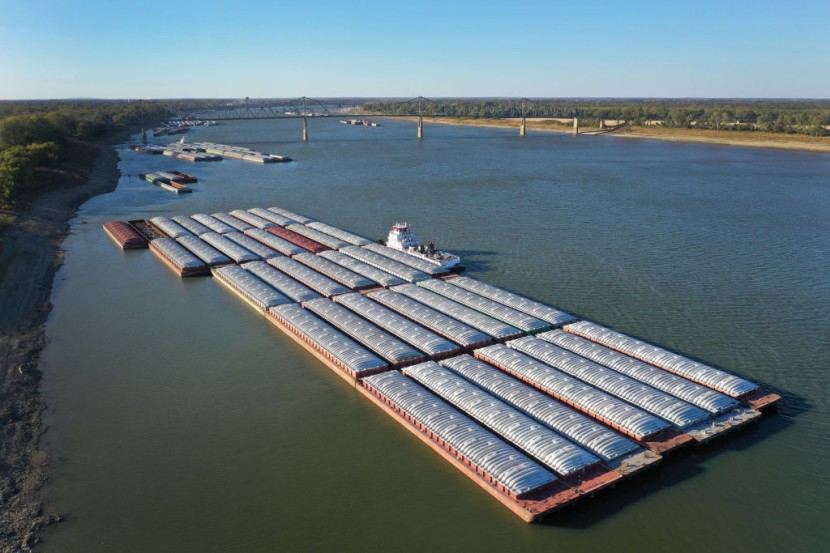
Nearly 900,000 people in Louisiana's drinking water are seriously at risk due to a serious problem with saltwater intrusion in the Mississippi River's water supply.
Prolonged drought conditions have triggered this development and could have significant health implications for the affected population, according to Yahoo News
Saltwater Intrusion Threatens Water Supply in Louisiana
Water with elevated salinity levels carries substantial health risks if consumed, and the contamination may persist for months if the drought continues. The gravity of the situation prompted Mayor of New Orleans LaToya Cantrell to declare a state of emergency, a move that aligns with the Governor's Office.
During a news conference in New Orleans, Governor John Bel Edwards expressed his concern, stating, "Unfortunately, we just haven't had the relief from dry conditions that we need."
This declaration of a state of emergency underscores the situation's urgency and the need for swift action. Many residents and business owners in the affected areas are apprehensive about their health and safety. Some have expressed their frustrations, with some even considering relocating to escape the growing crisis.
Governor Edwards, accompanied by state and local leaders, emergency officials, and representatives from the US Army Corps of Engineers, provided an update on the saltwater intrusion issue during a press conference. Dr. Joseph Kanter, the State Medical Officer, emphasized that individuals might stop drinking the water due to its altered taste before it becomes a direct health hazard.
In response to the escalating crisis, Governor Edwards has requested a federal emergency declaration to authorize immediate protective measures. The underlying cause of this saltwater intrusion crisis is the historically low levels of rainfall in the Mississippi River basin.
Typically, fresh water from the river flows downstream to push back the intrusion of salty water from the Gulf of Mexico. However, the deficiency in freshwater has disrupted this natural balance.
The saltwater wedge, a wedge-shaped intrusion of saline water, has advanced nearly 15 miles upstream in just seven days, according to the US Army Corps of Engineers. Municipalities in southeast Louisiana, including New Orleans, rely on the Mississippi River as their primary source of drinking water, intensifying the threat to the region's water supply.
According to Col. Cullen Jones, the corps' New Orleans district commander, the situation has reached a critical point as saltwater began to surge over the sill on Wednesday. The saltwater's height will increase by 5 feet below the river's surface over the next three weeks. This surge may delay the movement of saltwater upstream for an additional 10 to 15 days.
In response to the crisis, millions of gallons of water must be delivered daily to treatment facilities via water barges. Governor Edwards has urged households not to engage in panic buying of bottled water and has called upon businesses to increase their inventory to ensure store shelves remain stocked, as per The Weather Channel via MSN.
Elevated Salt Levels Pose Risks for Vulnerable Populations
The Department of Health has issued concerning reports indicating that sodium chloride levels in certain areas have exceeded the safe consumption threshold of 250 mg/L. Populations at the highest risk include individuals on low-sodium diets, pregnant women, and infants.
Commander Jones provided a timeline for the potential impacts of saltwater intrusion on various areas: Belle Chasse is the first expected to be impacted by October 13, followed by Dalcour by October 15, St. Bernard by October 19, and New Orleans/Algiers by October 22. Gretna is anticipated to be affected by October 24, with West Jefferson following on October 25, New Orleans/Carrollton by October 28, and East Jefferson by October 29.
The crisis has been ongoing, with Governor Edwards declaring a state of emergency for Plaquemines Parish in July due to the saltwater issue. Residents have expressed their frustrations and growing discontent as they struggle with everyday tasks like cooking, bathing, and cleaning.
Byron Marinovich, owner of the seafood restaurant Black Velvet, shared his perspective, saying, "We are ready to move. We are ready to get out of here. My wife is house shopping today. Everybody wants out."
He emphasized the challenges of saltwater intrusion, highlighting issues like skin rashes and the need to bathe in salt-contaminated water. The situation remains dire for affected residents, who yearn for a swift resolution to this escalating crisis, Daily Mail reported.








